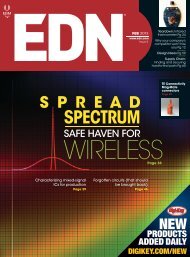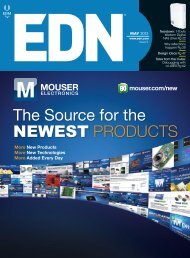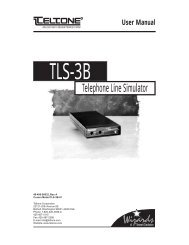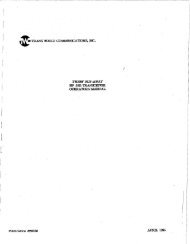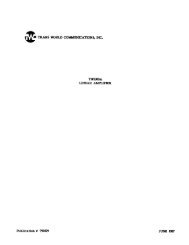201303.pdf 36567KB Mar 22 2013 09:11:22 PM
201303.pdf 36567KB Mar 22 2013 09:11:22 PM
201303.pdf 36567KB Mar 22 2013 09:11:22 PM
Create successful ePaper yourself
Turn your PDF publications into a flip-book with our unique Google optimized e-Paper software.
pulse<br />
VOICES<br />
Peter Spitzer: Motivated<br />
by testing, challenges,<br />
and constant learning<br />
In late January, EDN’s sister site Test & Measurement World<br />
named Peter Spitzer its <strong>2013</strong> Test Engineer of the Year. A member<br />
of the TRICENTIS team since 2008, Spitzer is currently the<br />
team lead at TRICENTIS Test, responsible for quality assurance<br />
of the TOSCA Testsuite, including creation/planning and implementation<br />
of test concepts and reporting the test results. Test &<br />
Measurement World Editor-in-Chief Janine Love spoke to Spitzer<br />
about his fascination with test, as well as his plans for the $10,000<br />
grant that comes with the award. Following is a portion of that discussion.<br />
Read more online at www.edn.com/4406136.<br />
How/why did you get<br />
started in engineering?<br />
I was influenced by my<br />
A uncle. He worked as a<br />
test manager for many years<br />
and gave me my first desktop<br />
PC. It was great fun for me<br />
(and still is) to solve problems<br />
with hardware and software. I<br />
guess this first professional<br />
contact blazed the trail for my<br />
career. At the age of 15 or 16,<br />
I discarded my dreams of<br />
becoming a policeman and<br />
decided that I wanted to work<br />
in the IT business. The testing<br />
part of my job just happened.<br />
Tell me a bit about your<br />
professional history.<br />
I studied at the Technical<br />
A University of Vienna for<br />
four years and am still studying<br />
medical information systems<br />
at the university.<br />
I first worked for a large<br />
pharmaceutical company,<br />
Boehringer Ingelheim, on<br />
internal support and software<br />
testing and then joined<br />
TRICENTIS in 2008. My first<br />
assignment at TRICENTIS<br />
was to test the company’s<br />
own TOSCA Testsuite prior to<br />
release rollout. I was later promoted<br />
to senior consultant,<br />
and two years ago I became<br />
the test manager.<br />
What do you find interesting/intriguing/fascinating<br />
about test?<br />
One of the endlessly<br />
A interesting and fascinating<br />
things about software testing,<br />
test automation, and test<br />
management is the variability<br />
in terms of what needs to be<br />
tested. Testing as a profession<br />
is never straightforward. You<br />
always have new situations<br />
where you have to adapt your<br />
skills, methods, strategies,<br />
and even tools.<br />
I wasn’t born to do repetitive<br />
work. This is why I enjoy solving<br />
the redundant testing with<br />
test automation and finding<br />
ways to increase efficiency and<br />
improve effectiveness. I love<br />
the challenge, the competition,<br />
and solving tricky puzzles.<br />
Another point that fascinates<br />
me is the never-ending<br />
learning that comes with<br />
software quality assurance.<br />
I never go to work without<br />
learning something new.<br />
There are new hurdles that I<br />
have to overcome, and this<br />
motivates me every day.<br />
When I started as a test<br />
engineer in 2008, the most<br />
intriguing facet of testing was<br />
the endless variety of options<br />
and methodologies to develop<br />
and execute tests and all the<br />
different flavors of test tools<br />
and methods in the market.<br />
What impressed me about<br />
TOSCA is that the tools are<br />
not just ways to automate<br />
but can also enable testers to<br />
take a risk-based approach<br />
and test the right things in the<br />
right priority order.<br />
Any test tools you wish<br />
you had?<br />
I wish that we had test<br />
A data management<br />
(TDM) in the early days when<br />
I started testing. In the past,<br />
we had to create our own test<br />
data for particular test cases.<br />
We could try to use production<br />
data but then needed<br />
to mask the data or spend<br />
weeks creating fictitious test<br />
data for a particular test.<br />
Today with TDM, this step is<br />
no longer necessary because<br />
the test team is able to build<br />
a test case and automatically<br />
generate the perfect test data<br />
for that particular scenario.<br />
This saves us months of work.<br />
In the future, I can see a<br />
time where the next generation<br />
of testing is much more integrated<br />
with the agile sprints<br />
and where the test automation<br />
begins much earlier in a<br />
project. Often we are brought<br />
in a bit later in the game. Shifting<br />
the testing to the left of<br />
the development release cycle<br />
would let us catch defects and<br />
errors much sooner in the process.<br />
If we could catch these<br />
when they are in the requirements<br />
phase, that would be<br />
even better.<br />
Any advice for new<br />
engineers?<br />
I’m not yet an “old<br />
A hand” in this business.<br />
What I can tell you is that, for<br />
me, working as a test engineer<br />
is one of the most fulfilling<br />
and rewarding experiences<br />
I’ve had so far. As a tester you<br />
should be a communicative<br />
person, offer good analytical<br />
and social skills, and have<br />
good perception along with a<br />
passion for solving tricky puzzles.<br />
All I would recommend is<br />
be persistent, insist on excellence<br />
in testing, and use every<br />
source of knowledge you can<br />
get to become a better tester.<br />
You will receive a $10,000<br />
grant to give to the educational<br />
institution of your<br />
choice (courtesy of award<br />
sponsor National Instruments).<br />
What will you do<br />
with it?<br />
I would like to set up a<br />
A scholarship fund for a<br />
student who is interested in<br />
a career in software testing<br />
but is economically disadvantaged.<br />
We will be contacting a<br />
university shortly to see if this<br />
is feasible.<br />
What’s next for you?<br />
There is always a<br />
A “next.” You’ll never<br />
reach a point where you can<br />
say, “I’ve seen everything;<br />
I know everything.” There’s<br />
constant learning and further<br />
training until the end of your<br />
career.<br />
20 EDN | <strong>Mar</strong>ch <strong>2013</strong> [ www.edn.com ]


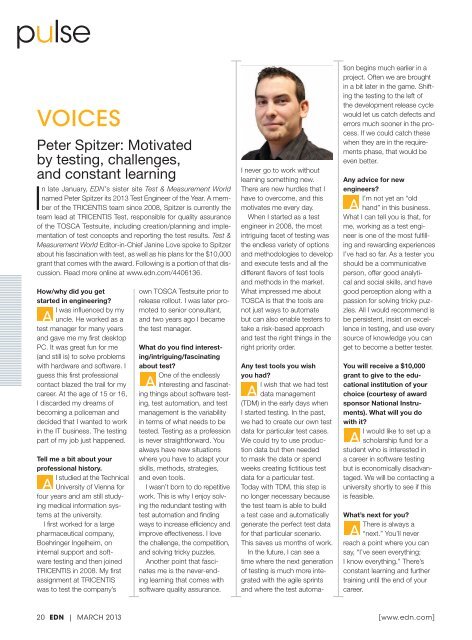
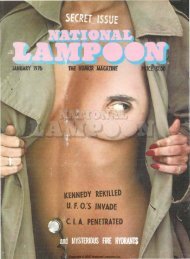
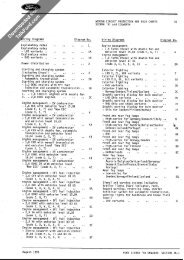
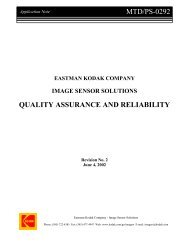
![[270].pdf 37407KB Sep 02 2010 09:55:57 AM - ElectronicsAndBooks](https://img.yumpu.com/50350834/1/185x260/270pdf-37407kb-sep-02-2010-095557-am-electronicsandbooks.jpg?quality=85)
![draaien, A Viruly 1935 OCR c20130324 [320]. - ElectronicsAndBooks](https://img.yumpu.com/49957773/1/190x252/draaien-a-viruly-1935-ocr-c20130324-320-electronicsandbooks.jpg?quality=85)
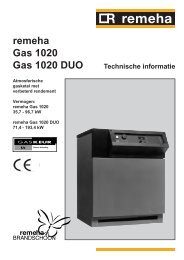
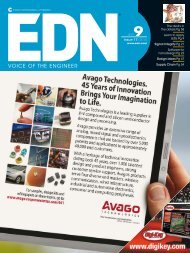
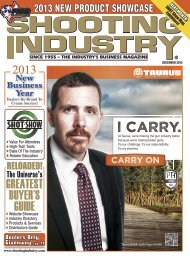
![20051110 c20051031 [105].pdf 35001KB Feb 18 2009 08:46:32 PM](https://img.yumpu.com/48687202/1/190x253/20051110-c20051031-105pdf-35001kb-feb-18-2009-084632-pm.jpg?quality=85)
